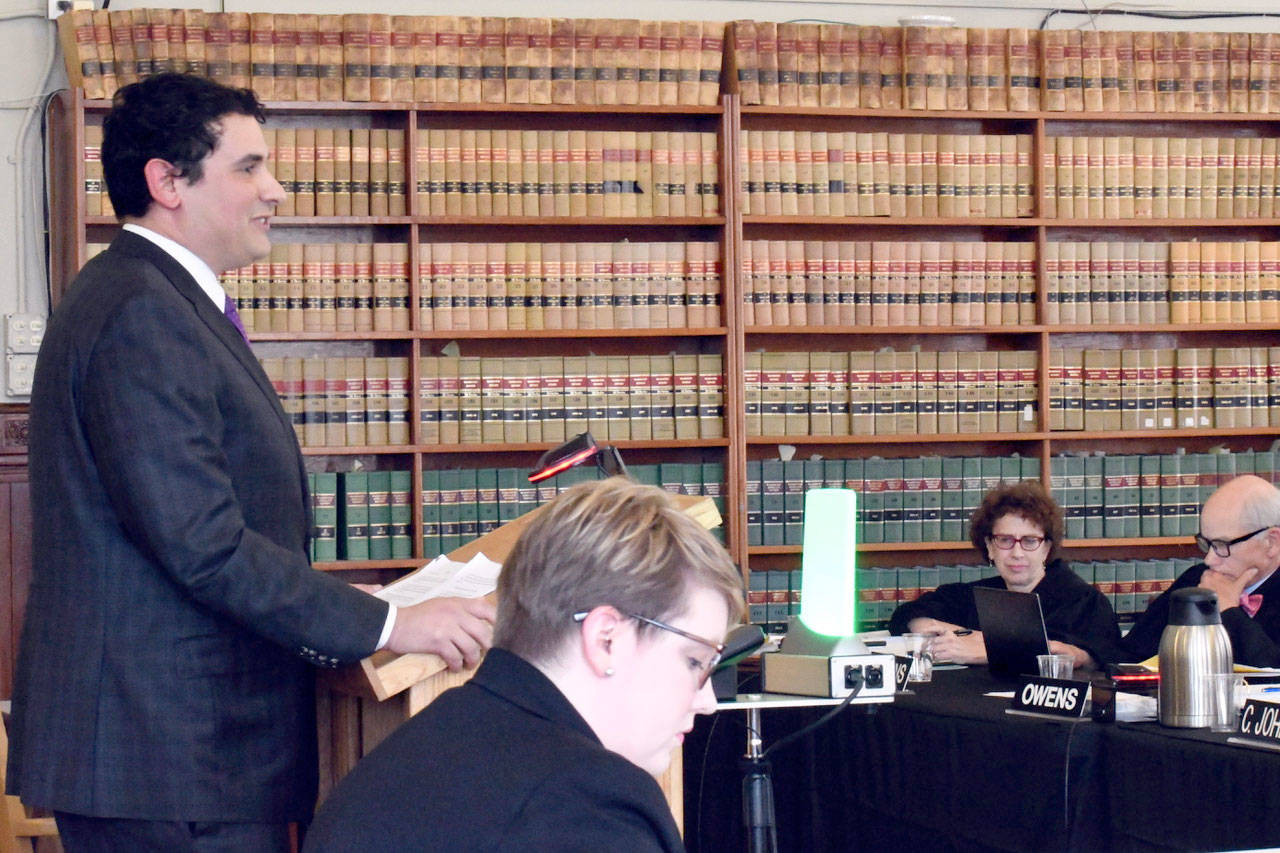PORT TOWNSEND — A standing-room-only crowd packed the Jefferson County Superior Court courtroom Tuesday as Washington state’s nine Supreme Court Justices heard oral arguments for three cases.
The justices were in Port Townsend as part of a yearly tour that takes them to three communities. It has been 18 years since they last visited Port Townsend. In 2015, the court convened in Forks, where Justice Susan Owens once served as Clallam County District Court judge.
The public asked a few questions after the morning and afternoon sessions, with one going to the court’s bailiff, Guy Rosser. He uses several gavels during the proceedings, explaining he uses four because there are nine justices and it “takes time to get them all in.”
“The court’s historical society sells them and the money raised is used to buy art for the Temple of Justice in Olympia,” Rosser said.
Jacob Metzger, a Port Townsend High School graduate, argued one of the three cases. He was representing Service Employees International Union Local 925.
“It’s very exciting and just a wonderful happenstance that this case is being heard in Port Townsend and I’m able to argue it in front of friends and family,” Metzger said.
Superior Court Judge Keith Harper welcomed those in the courtroom, providing a brief introduction to the proceedings.
“For those of you who follow the U.S. Supreme Court, the way our state Supreme Court hears cases and functions is very similar,” Harper said. “This is a great opportunity for all of you to see how this works.”
Chief Justice Mary Fairhurst said the justices “spent the most wonderful time in Jefferson County.”
“One thing we do in travel court that we don’t do in Olympia is a question-and-answer period,” Fairhurst said.
During the proceedings, each attorney had 20 minutes to argue his position, and it could be split up any way, focusing on arguments or rebuttals. The justices could ask questions at any time during the presentations.
The first case heard was the State of Washington v. Frank A. Wallmuller. The case centered on whether the sentencing condition would bar the defendant from loitering in a non-exclusive list of places where children congregate.
Timothy J. Higgs, deputy prosecutor for Mason County, argued that the case was about language.
Wallmuller had been convicted of two sex offensives against children and, as a condition of community custody after being released from the penal institution, the court required that he “shall not loiter and or frequent places where children congregate such as parks, video arcades, campgrounds and shopping malls.”
Higgs said the idea is to protect the public and prevent Wallmuller from re-offending.
“The court of appeals ruled the language was invalid because it isn’t specific enough,” Higgs said. “The court’s idea was to delete the phrase ‘such as’ so it would be more specific so he would be prevented from going to those places.
He asked that if there is a list of descriptive places, does that list eliminate the vagueness of the condition?
Counsel Lisa Elner representing Wallmuller said the original condition in the case did not serve its primary purpose, which is to protect children.
“There is a reason why we apply vagueness analysis,” Elner said. “We assume an offender can choose between lawful and unlawful conduct. That is impossible without notice.”
In the second case, two young attorneys argued the Service Employees International Union Local 925 v. The University of Washington, Freedom Foundation.
Sydney Phillips, attorney for the Freedom Foundation, said this was her first time in front of the Supreme Court and only her fourth argument in front of judges.
Phillips said a professor at the university was using his school-provided email on university-provided servers to discuss unionizing in a non-union shop. The emails were sent during work hours. She argued that a court may not rely on the descriptions of employee records to determine if the records contain information that was subject to the public records act.
Representing the Service Employees International Union, Metzger said the documents were not public records.
“Union organizing in its initial stages when employees are talking among themselves about the decision whether or not to form a union don’t have any relationship to actual conduct of government. They are not public records under the public records act.”
The justices heard one case during the afternoon session. Mark Elster and Sarah Pynchon v. City of Seattle questioned if Seattle’s Democracy Voucher Program, funded through a property tax, violates the First Amendment.
Ethan Blevins representing Elster and Pynchon, said the First Amendment is implicated because property owners pay taxes. Whether the subsidy comes from general revenue or assessment, the subsidy is the same.
Gregory Narver representing the City of Seattle, argued that the voucher program neither burdens nor restricts speech and is based on objective, non-discriminatory criteria.
The Supreme Court Justices in Port Townsend was recorded by TVW, Washington’s Public Affairs network, and will be available for broadcast at https://www.tvw.org/ in the next few weeks.
________
Jefferson County Reporter Jeannie McMacken can be reached at 360-385-2335 or at jmcmacken@peninsuladailynews.com.

